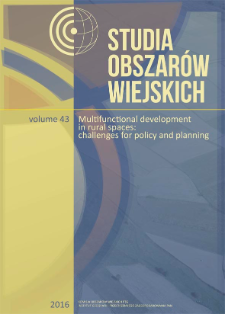- Wyszukaj w całym Repozytorium
- Piśmiennictwo i mapy
- Archeologia
- Baza Młynów
- Nauki przyrodnicze
Wyszukiwanie zaawansowane
Wyszukiwanie zaawansowane
Wyszukiwanie zaawansowane
Wyszukiwanie zaawansowane
Wyszukiwanie zaawansowane

Obiekt
Tytuł: Thematisation of space as a local development factor. Case study of Sierakowo Sławieńskie and Masłomęcz
Twórca:
Wójcik, Marcin ; Tobiasz-Lis, Paulina ; Dmochowska- Dudek, Karolina
Data wydania/powstania:
Typ zasobu:
Inny tytuł:
Studia Obszarów Wiejskich = Rural Studies, t. 43
Wydawca:
Miejsce wydania:
Opis:
Typ obiektu:
Abstrakt:
From the perspective of cultural transformations in rural areas within the last 30 years, the core process is the empowerment of local communities and thus reinforcement of social and territorial identity. The aim of the article is to identify good practices applied in the process of positive changes in selected villages as a result of mobilisation and coordination of own resources and energy, creativity and hard work of people, supported by various external incentives. Adjustment to the “place” in the process of thematisation of space results from cooperation of the local community with its nearest environment, which consists in analysing and interpreting the existing conditions with regard to the planned changes. Then, the specific assets of the environment were identified to develop further local stories, related to the original motif. Those original concepts constitute an extraordinary act of creation of the place and its adjustment to the needs of the local community and visitors. In both cases, the identification and use of specific resources was of key importance, combined with important external incentives in the form of first process creators (experts) and then possibilities of financing the entire initiative (e.g. EU funds).
Bibliografia:
1. Biczkowski M., 2013, Fundusze unijne jako czynnik rozwoju regionalnego w odniesieniu do koncepcji rozwoju neoendogenicznego, Studia Obszarów Wiejskich, 34, pp. 71–85.
2. Czapiewski K.Ł.., 2010, Koncepcja wiejskich obszarów sukcesu społeczno-gospodarczego i ich rozpoznanie w województwie mazowieckim, Studia Obszarów Wiejskich, 22.
3. Gorzelak G. (ed.), 2015, Polska gmina 2015, Wydawnictwo Naukowe Scholar, Warszawa.
4. Kłodziński M., Błąd M., Wilczyński R. (ed.), 2007, Odnowa wsi w integrującej się Europie, Instytut Rozwoju Wsi i Rolnictwa, Warszawa.
5. Nurzyńska I., Drygas M. (ed.), 2011, Rozwój obszarów wiejskich w Polsce, Instytut Rozwoju Wsi i Rolnictwa, Warszawa.
6. Psyk-Piotrowska E., Zajda K., Kretek-Kamińska A., Walczak-Duraj D., 2013, Struktura i uwarunkowania kapitału społecznego lokalnych grup działania, Wydawnictwo UŁ, Łódź.
7. Ray Ch., 2006, Neo-endogenous rural development in the UE, [in:] Handbook of Rural Studies, pp. 278–292.
8. Rosner A. (ed.), 2012, Społeczne i kulturowe zagadnienia przemian na wsi polskiej, Instytut Rozwoju Wsi i Rolnictwa, Warszawa.
9. Rzeńca P., 2015, Tematyzacja przestrzeni jako metoda zarządzania rozwojem lokalnym, [in:] A. Nowakowska (ed.), Nowoczesne metody i narzędzia zarządzania rozwojem lokalnym i regionalnym, pp. 113–141.
10. Wójcik M. (ed.), 2014, Regionalny wymiar przemian polskiej wsi – aspekty społeczne i środowiskowe, Studia Obszarów Wiejskich, 35.
11. Wójcik M., Czapiewski K.Ł. (ed.), 2015, Edukacja i kapitał ludzki w rozwoju lokalnym i regionalnym, Studia Obszarów Wiejskich, 40.
Czasopismo/Seria/cykl:
Tom:
Strona pocz.:
Strona końc.:
Szczegółowy typ zasobu:
Format:
Rozmiar pliku 3,8 MB ; application/pdf
Identyfikator zasobu:
oai:rcin.org.pl:61818 ; 1642-4689 ; 10.7163/SOW.43.8
Źródło:
CBGiOŚ. IGiPZ PAN, sygn. Cz.4488 ; CBGiOŚ. IGiPZ PAN, sygn. Cz.4489 ; kliknij tutaj, żeby przejść
Język:
Język streszczenia:
Prawa:
Licencja Creative Commons Uznanie autorstwa 3.0 Polska
Zasady wykorzystania:
Digitalizacja:
Instytut Geografii i Przestrzennego Zagospodarowania Polskiej Akademii Nauk
Lokalizacja oryginału:
Dofinansowane ze środków:
European Union. European Regional Development Fund ; Programme Innovative Economy, 2010-2014, Priority Axis 2. R&D infrastructure
Dostęp:
Kolekcje, do których przypisany jest obiekt:
- Repozytorium Cyfrowe Instytutów Naukowych > Kolekcje Partnerów > Instytut Geografii i Przestrzennego Zagospodarowania PAN > Publikacje pracowników i Wydawnictw
- Repozytorium Cyfrowe Instytutów Naukowych > Kolekcje Partnerów > Instytut Geografii i Przestrzennego Zagospodarowania PAN > Biblioteka Instytutu > Serie/Czasopisma/Cykle
- Repozytorium Cyfrowe Instytutów Naukowych > Piśmiennictwo > Książki/Rozdziały
Data ostatniej modyfikacji:
2 paź 2020
Data dodania obiektu:
9 mar 2017
Liczba pobrań / odtworzeń:
1253
Wszystkie dostępne wersje tego obiektu:
https://rcin.org.pl./publication/81513
Wyświetl opis w formacie RDF:
Wyświetl opis w formacie RDFa:
Wyświetl opis w formacie OAI-PMH:
Obiekty Podobne
Tobiasz-Lis, Paulina Wójcik, Marcin
Podolska, Anna
Wójcik, Marcin
Jadczyszyn, Jan Rosner, Andrzej
Beňušková, Zuzana
Wolski, Oskar Sykała, Łukasz

 INSTYTUT ARCHEOLOGII I ETNOLOGII POLSKIEJ AKADEMII NAUK
INSTYTUT ARCHEOLOGII I ETNOLOGII POLSKIEJ AKADEMII NAUK
 INSTYTUT BADAŃ LITERACKICH POLSKIEJ AKADEMII NAUK
INSTYTUT BADAŃ LITERACKICH POLSKIEJ AKADEMII NAUK
 INSTYTUT BADAWCZY LEŚNICTWA
INSTYTUT BADAWCZY LEŚNICTWA
 INSTYTUT BIOLOGII DOŚWIADCZALNEJ IM. MARCELEGO NENCKIEGO POLSKIEJ AKADEMII NAUK
INSTYTUT BIOLOGII DOŚWIADCZALNEJ IM. MARCELEGO NENCKIEGO POLSKIEJ AKADEMII NAUK
 INSTYTUT BIOLOGII SSAKÓW POLSKIEJ AKADEMII NAUK
INSTYTUT BIOLOGII SSAKÓW POLSKIEJ AKADEMII NAUK
 INSTYTUT CHEMII FIZYCZNEJ PAN
INSTYTUT CHEMII FIZYCZNEJ PAN
 INSTYTUT CHEMII ORGANICZNEJ PAN
INSTYTUT CHEMII ORGANICZNEJ PAN
 INSTYTUT FILOZOFII I SOCJOLOGII PAN
INSTYTUT FILOZOFII I SOCJOLOGII PAN
 INSTYTUT GEOGRAFII I PRZESTRZENNEGO ZAGOSPODAROWANIA PAN
INSTYTUT GEOGRAFII I PRZESTRZENNEGO ZAGOSPODAROWANIA PAN
 INSTYTUT HISTORII im. TADEUSZA MANTEUFFLA POLSKIEJ AKADEMII NAUK
INSTYTUT HISTORII im. TADEUSZA MANTEUFFLA POLSKIEJ AKADEMII NAUK
 INSTYTUT JĘZYKA POLSKIEGO POLSKIEJ AKADEMII NAUK
INSTYTUT JĘZYKA POLSKIEGO POLSKIEJ AKADEMII NAUK
 INSTYTUT MATEMATYCZNY PAN
INSTYTUT MATEMATYCZNY PAN
 INSTYTUT MEDYCYNY DOŚWIADCZALNEJ I KLINICZNEJ IM.MIROSŁAWA MOSSAKOWSKIEGO POLSKIEJ AKADEMII NAUK
INSTYTUT MEDYCYNY DOŚWIADCZALNEJ I KLINICZNEJ IM.MIROSŁAWA MOSSAKOWSKIEGO POLSKIEJ AKADEMII NAUK
 INSTYTUT PODSTAWOWYCH PROBLEMÓW TECHNIKI PAN
INSTYTUT PODSTAWOWYCH PROBLEMÓW TECHNIKI PAN
 INSTYTUT SLAWISTYKI PAN
INSTYTUT SLAWISTYKI PAN
 SIEĆ BADAWCZA ŁUKASIEWICZ - INSTYTUT TECHNOLOGII MATERIAŁÓW ELEKTRONICZNYCH
SIEĆ BADAWCZA ŁUKASIEWICZ - INSTYTUT TECHNOLOGII MATERIAŁÓW ELEKTRONICZNYCH
 MUZEUM I INSTYTUT ZOOLOGII POLSKIEJ AKADEMII NAUK
MUZEUM I INSTYTUT ZOOLOGII POLSKIEJ AKADEMII NAUK
 INSTYTUT BADAŃ SYSTEMOWYCH PAN
INSTYTUT BADAŃ SYSTEMOWYCH PAN
 INSTYTUT BOTANIKI IM. WŁADYSŁAWA SZAFERA POLSKIEJ AKADEMII NAUK
INSTYTUT BOTANIKI IM. WŁADYSŁAWA SZAFERA POLSKIEJ AKADEMII NAUK




































